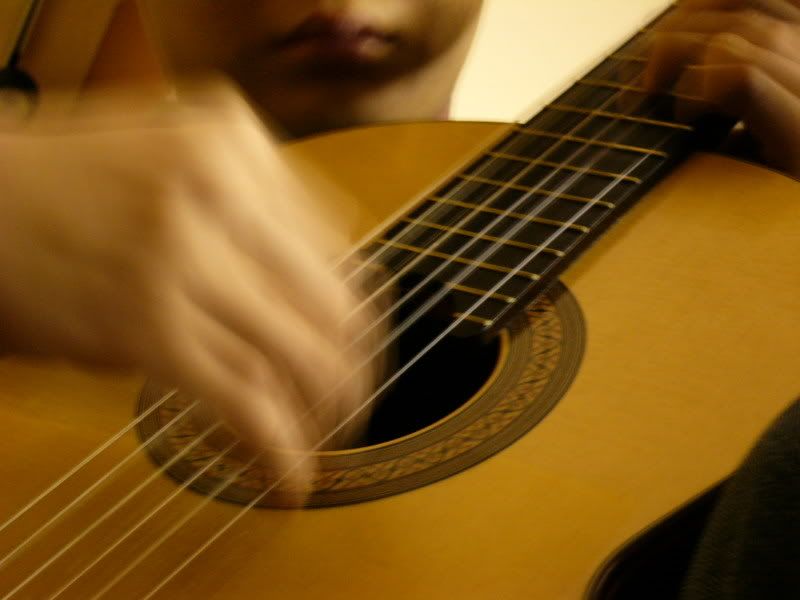Saturday, December 17, 2005
Apart from an obsession with multi-player Pro Evolution Soccer 5 on one of my hall-mates' PS2, I've done some reading, reading the newspapers end-to-end, and I've also gotten around to reading Dickens' Great Expectations. I have never read Dickens before, mostly because I always thought that his portrayal of the Victorian era was rather gloomy (from what I know of his plots), as well as my instinctive aversion to anything popularly acclaimed. In fact, I started reading the book as a soporific, to help me sleep, but very quickly his wit and the humanity of his characters won me over. I also found his portrayal of children to be wonderfully charming and warm.
I've also lost control of my appetite in the past week. I have managed to lose a couple of kilograms in the past couple of months through my regime of running, volleyball, gym and not eating junk food, but lately I've thought 'what the hell...' and stuffed my face. So this afternoon, in guilt of the double-scoop Baskin Robbin's I had scoffed earlier, I decided to go out for a run, my first in a few weeks.
It was dark by then (6pm), and as usual I went out in just a long-sleeved t-shirt, shorts and gloves. I made good progress in the first couple of km, heading down towards Regent's Park, before start my ascent up Primrose Hill, looping back towards Netherhall. Primrose Hill, which overlooks central London, isn't very high, but nevertheless running up it is about 7 minutes of exertion which stretches into what seems like an eternity of pain (all you long-distance runners out there, bear with this beginner for a while...).
I've run up this slope many times, but this time the lights along the running path were broken, so it was dark near the top. As I trudged up the hill, a bitter sub-zero wind started blowing at me, just as I was pushing my muscles and lungs to carry me through. So there I was in a t-shirt as the biting wind made my whole body go numb, muscles and lungs straining while I couldn't see 5 feet in front of me thanks to the dark and my watering eyes (from the wind). Everything seemed unreal, and my consciousness started detaching from my body undergoing punishment. As I gritted my way through, every second seemed to last a lifetime, but finally I got down the other side of the hill, where the worst of the wind was blocked off by the rows of houses.
I usually only run about 4-5 km at a time, and yet everytime it's a struggle for me to keep going in the final km. I can't help but admire the runners who can run 42 km of a marathon; while they have superb stamina, nevertheless after about 20km they start aching, and the last few kilometres are always sustained through sheer willpower.
Tuesday, December 13, 2005
The GRE Physics was held in LEEDS of all places, presumably because it was the geographical centre of the UK (they should have held it at geographical centre weighted by population, which would probably mean something like Watford in North London...). So I had to undertake the 5 hour coach journey northwards to Leeds, but fortunately Rachel, one of my classmates, was going as well. As the exam was on Saturday morning, we arrived in Leeds the night before and stayed at a B&B nearby. The place was OK, but for the fact that Leeds was unseasonably warm (warmer than London, in fact), and the room had heating I could not seem to turn off and a very tiny window. As a result, I was sweating like a horse, and couldn't get a wink of sleep all night.
Not a good preparation for what is probably the most important single exam of my life. Nevertheless, there was nothing to be done except to sit down and do the exam. The exam was 100 physics multiple-choice questions that had to be done in 170 minutes. A few of them are really easy high school stuff, but most of them involve some thought and calculations (NO calculator allowed), and quite a few are difficult. So one has to fast and accurate, which isn't particulary easy to pull off in state. It was so bad that my sleep-deprived brain thought that 1.5/2 was the same as 3/2. Nevertheless, I don't think I performed superbly, but it should still be an acceptable mark.
As we were boarding the coach home, Rachel boarded first and showed the driver the e-ticket for both of us. As I was getting on, I gestured at her and told him 'I'm with her'. He then replied with his Yorkshire burr, 'But are you sure she wants you to be with her?' and waved me on.
It's the last week of term, and I can't be arsed to do anything. Due to my applications, I have not done much of my project work, and it's menacing presence looms over my consciousness at all times. Also, my supervisor Kinwah gave me a major slagging off last week, the gist of which was that I may be the top student here, but I may become small fry if I do my Phd in a top university.
So I'm momentarily discouraged, and burnt out from working almost non-stop all year (I spent summer doing my two internships, as you may recall). I really need a break...
Monday, November 21, 2005
Wednesday, November 16, 2005
So, bang came Tuesday the 8th of November seemingly out of nowhere. I had honestly gone past the stage of caring what people would think of my playing, as other pressing concerns (e.g. PhD applications, exams etc) were foremost on my mind, so I wasn't concerned as I returned home from morning lectures, a scant few hours before the concert. Indeed, the foremost concern in my mind was whether I could manage to tie the bow-tie (the real deal, not a clip-on) that Hon Weng had lent me.
As Jane turned up, violin in hand, with her accompanyist to do some practising just a couple of hours before the concert was supposed to start at 7.30pm, I was trying not to strangle myself in my attempts to tie the bow around my neck. Neil P. was supposed to be the organiser for the concert, but it turned out he was only just returning from a trip to Mexico that very afternoon, and had turned over most of the detailed organisation to Alvaro and Eugene (our resident Singaporean working for a Malaysian concert...brilliant). However, both of them were a bit clueless about the demands on the ground, so I had to pick up the ball, making sure that all the four musicians were taken care of. I was running around trying to find someone to re-arrange the stage furniture between musicians (classical guitarists, violinists, and pianists have rather different requirements as to what they need on-stage), find a page-turner for Jane's accompanyist, sort out some dinner for them, etc etc. I did quite a lot of exercise running up and down (and in leather shoes, at that...) sorting these things out as the guests started to filter in.
At 15 minutes before my concert, I just about managed to get the tie around my neck, and get my fingers stretched just as the MC started his spiel (at that point, it was the first time I had touched my guitar all day, let alone practise). I was surprisingly calm. Normally, just before I have to play before in public, my fingers would go numb from stage fright, but this time the adrenaline rush of the organising work kept my nerves steady.
The first movement of my Bach, the Prelude, was almost perfect, which seldom occurs even in practice. The second movement, a heavy finger-busting Fugue, was less than perfect, but still I managed to play well with lots of feeling and passion, in contrast with my usual machine-like playing in public. However, I could not avoid succumbing to fatigue as the Fugue was that demanding, and the last Allegro movement was a bit of a mess. Nevertheless, I managed to avoid breaking my fingers in the process, and the progression of the music was at least uninterrupted overall. The final piece, Vals Venezolano no.3, went quite well overall, as well as could be expected considering that my fingers were burning with fatigue by then, and I used some declamation in my expressions which I think the audience liked.
So, my role finished, I could afford to kick back and heave a very large sigh of relief (and untie the thing choking my neck). Also, Eugene decided to take my photo after I had finished performing (in 6 years of playing I have only had 1 picture taken of me while playing the guitar).
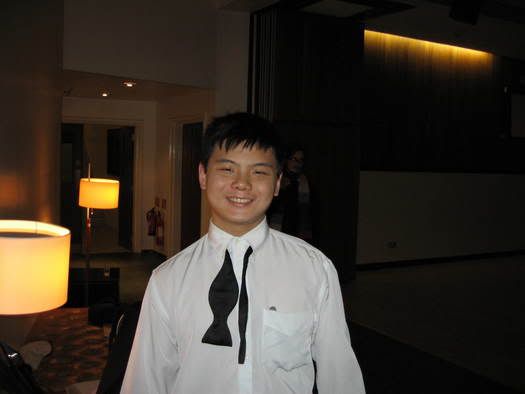 The bow tie looks cooler untied. I'm grinning so widely, obviously because I have just had a millstone removed from around my neck.
The bow tie looks cooler untied. I'm grinning so widely, obviously because I have just had a millstone removed from around my neck.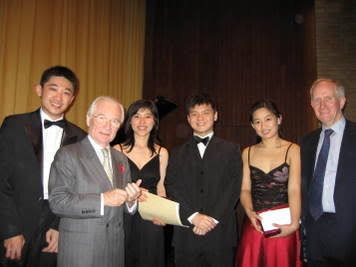 From left to right, Bobby Chen (piano), Datuk Neville Green, Jane Ng (violin), yours truly, Foo Mei Yi (piano, and Neil Pickering.
From left to right, Bobby Chen (piano), Datuk Neville Green, Jane Ng (violin), yours truly, Foo Mei Yi (piano, and Neil Pickering.So that's it. I'm not going to touch my guitar for at least a couple of weeks, and I can now let other things stress me out totally.
Friday, November 11, 2005
Monday, November 07, 2005
Part of the reason is that I often give myself excuses not to practise. Even in the past couple of weeks, I doubt I managed to put in 12-13 hours per week, which considering that I haven't even finished memorising the pieces until 3 weeks ago, isn't a very wise idea.
This laziness contradicts squarely with my perfectionism, which means that when I do practise, it's extremely frustrating. To be fair, it is only 3 or 4 awkward bars in the entire programme which have been giving me problems, but passing through those bars brings a huge amount of tension into my fingers, which is detrimental to the rest of the music. A large portion of my practise time has been devoted to trying to iron out those few kinks, but it just hasn't worked.
After this morning's practise, I'm just decided to give up any hopes of playing perfectly, or even expressing the music the way I want it to. It's going to be every musician's nightmare: to play a half-baked concert.
Friday, October 28, 2005
| Some days ago, I met up with a few friends from my course last year who have now moved on to other things. Xinhui is now doing a Master's course in Physics in Oxford, while Raj is doing Material Science in Cambridge. Fahd and I were the two people still remaining in UCL. | ||
Saturday, October 22, 2005
So I'm without my project supervisor until early November, and 'merely' have to read up on about 60 pages of radiative transfer physics. This means that I have to force myself to sit down and actually study, which isn't something I can get up to this early in term. It's something to study a topic when it's in set out and nicely defined in a syllabus, and another thing when it's basically open-ended.
I haven't spent as much time as I should be doing the things I'm supposed to. I was aiming to work for at least 6 days a week, but in reality I'm managing something like 4 or 5. It doesn't help that my current top priority is applying for my PhD places, which involves filling in applications, writing personal statements and preparing for the American GRE tests. I reckon that when my supervisor gets back, I might get a bollocking from him over how little I've achieved, but once I get my applications sent off I'll be able to focus more on the project.
Last night I watched Downfall, the German movie released earlier this year portraying the last days of Hitler as the Nazi regime verges on collapsed. It was really great film...it pulls no punches in showing the violence and horror of those last days, but I found it completely absorbing in a macabre way. The acting was superb...at no point did I doubt that the actor Bruno Ganz was Hitler himself. After the film ended, I was deeply disturbed and everyone else who was watching it was, too. I wholeheartly recommend Downfall, but it's not for the faint-hearted.
Monday, October 17, 2005
Saturday, October 08, 2005
In the mean time, I'll just have a health nazi rant. I was in M&S the other day to pick up some lunch. I was looking at some of the salads on the shelves, and I realised one thing: there aren't actually very much vegetables in any of those salads. Instead, they mostly seemed to be filled with pasta of one sort or other. How can you have a salad with hardly any vegetables?!? And this is from a retailer that has a reputation as a 'healthy' food supplier.
In Australia, I was eating so much fruit and veg that I was almost overdosing on the stuff. One of the most popular drinks franchises in Sydney is called 'Boost', which sells fruit smoothies, and there are several fast-food chains which specialise in salads, real salads with vegetables, not nonsense with 80% pasta. Vegetables are also outrageously cheap in supermarkets...I often end up having to carry 10 kilos of food home.
In contrast, the nutritional deficiency of most peoples' diets here are just plain alarming. Most people seem to go through the day without a shred of green or fresh fruit passing through their mouth. Even 'vegetarian' options seem to be loaded with carbohydrates without anything really nutritious. When trying to buy my lunch, it seems to be a daily challenge to try to find a balanced meal without paying through my nose, which is why I often end up eating at Subway: it might be more expensive but at least they load the sandwich with lots of vegetables. A lot of people do not seem to realise that it is recommended to eat at least 5 portions of fruit and veg per day to avoid cancer, and when they DO get cancer, it's as if it was totally unexpected. This is a totally unscientific pure speculation, but I suspect that it might one day be able to show causal links between diet and cancer in the same way we know know the causal link between smoking and lung cancer.
It might seem strange that I would turn out to be a health nazi, since I have more of a reputation as a gourmand. However, anyone who is observant will notice that while I eat large amounts, the food is actually quite balanced. That's it for today...it's off to have some grapes and juice....
Thursday, October 06, 2005
To quote Sir Winston Churchill...
We shaL go on 2 d nd, we shaL fite n France, we shaL fite on d seas & oceans, we shaL fite w grON confidNc & grON strength n d air, we shaL defend our islnd, wutevA d cost mA b, we shaL fite on d beaches, we shaL fite on d landing grounds, we shaL fite n d feLdz & n d st.z, we shaL fite n d hiLz; we shaL nevr surrender.
I think that was the sound of the English language finally raising a white flag...
Saturday, October 01, 2005
Anyway, as I was saying.....
Back to London, and a welcoming rain was drizzling down when I arrived. The flight was OK, apart from the fact that none of the inflight movies were appealing to me (Mr & Mrs Smith? No thanks). So I did a lot of reading... I had a couple of scientific papers that I had to read, and that was a bit going. Aside from that, I am reading a 'popular science' book on a mathematical problem called the Riemann hypothesis, which mathematicians have been trying to prove for over a century. I use quotation marks when referring to it as 'popular science' because it's not trivial... the author actually tries to explain matrix and eigenvalue theory, not to mention bits of complex analysis.
I won't try to explain what the Riemann hypothesis is about, but it's basically something to do with how prime numbers are distributed throughout the real integers. What was fascinating were the large sections devoted to portraying the mathematicians past and present who were working on the problem. Physics tends to attract a lot of obsessive types, and I've encountered some of them (some might even consider yours truly to be one such person), but the mathematicians described are truly nutcases. They tend to start being obsessed with maths from a very early age, whereas I didn't really get into physics until about 2nd year in uni (I started the physics degree with the intention of going into planetary exploration). I guess part of my intimidation with such types is the fact that my own maths ability is my Achilles' heel, but still....
I also finally got round to writing my personal statement for my PhD applications. I'll be applying mostly to US universities, as I can only apply to one UK university. This is because I can only specify one institution for the Queen's Overseas Research Scholarship which is essentially my only source of funding in the UK, so I'll probably be choosing Cambridge, which is a reasonably safe choice. As for US universities, in rough order of preference: Stanford, Princeton ("Might be hard for you to get in", Kinwah said), Caltech, Chicago ("Good chance of getting in"), Harvard ("Pity...I know one of the admissions tutors but he's retiring this year"), Cornell ("Quite good chance..."), and as a backup, the University of California, Santa Cruz.
I'm essentially going to pick any of the US universities (apart from UC Santa Cruz) over Cambridge, because US PhDs take 5-6 years on average compared with 3 years for a UK PhD, and I think I need those extra years to work on my abovementioned weakness in maths.
Notice that apart from Chicago, all my US choices are either on the US Northeast or California....
Tuesday, September 27, 2005
Significantly, my mum didn't blame me for the situation, so I think I'm definitely not in the wrong. She also mentioned that dad used to have huge arguments with my grandfather whenever they disagreed (when the latter was still alive; he passed away months before I was born). Like father, like son....
I've also updated my other blog with a piece about my work in Sydney....
Thursday, September 22, 2005
I must say that I generally had fun here. Work was hectic because I was trying to cram 3 months' research into 2, and it was a bit lonely after Sam and Pablo finished their time here. But Sydney is a fantastic city, and I wouldn't hesitate to live here (whether I would work here however, is a different matter). It's in fact my favourite city after Paris, and it has the great virtue that it isn't filled with French people!
It's not going to be easy to go back to the dreary weather and disgusting food that awaits me in London, but c'est la vie. Not to mention the fact that I have a shitload of work and things to do once I get back. A dozen PhD applications need to be filled out, and Kinwah will be cracking his whip to make sure I don't slip up in his project.
My sister is coming into Sydney tomorrow (Friday), and I was going to take the day off to show her around, but then she just messaged me saying that we should only meet up in the evening because she wanted to spent the day shopping.
Girls.
Wednesday, September 14, 2005
I can understand it when people get my name confused...even native Chinese speakers or Malaysians can get confused, as 'Gan' is a common surname as well, so that do not know whether Lee or Gan is my surname. However, it's with Westerners that my name truly gets mangled. People calling me 'Khee' I can live with, people thinking 'Lee' is my given name I can also live with, but when my article comes out in a magazine (Astronomy & Geophysics) with 'Gan Lee' in bold at the top corner in the pages, that's the final straw!
So if I let my first published article(s) be K.G. Lee et al. 2005, I would put up with about 40 years of my name being mangled beyond comprehension, so it'll be K.-G. Lee et al. 2005 to avoid this. Hmm...maybe I should have discussed this with my parents, although I don't imagine it's that big an issue. It's just hyphen after all.
Speaking of K.-G. Lee et al 2005, the MSSL paper was originally slated to be my first, but my supervisor is busy with his PhD student's thesis and wouldn't be free till the end of the month, so it'll only be finished when I get back to London. Fortunately, I have a second K.-G. Lee paper coming up (K.-G. Lee & J. Bland-Hawthorn 2005 actually, as it's just me and my supervisor here at AAO), although this is in an Australian journal which is a bit less impact, but with a bit more work we could probably follow it up in an American journal after I leave, albeit with the author names reversed.
Thursday, September 08, 2005
"Audaces, fortuna juvat"This is a phrase which means "Fortune favours the bold", by the Roman writer Virgil.
I chose this to reflect that much of what I have achieved so far in life has been down to a readiness to do what I feel is necessary despite what people think. Some of it might seem relatively trivial, like asking questions in class even if it makes other people think that I'm an arrogant twat, but in retrospect this is a habit which has made lecturers notice me when they wouldn't otherwise have. When applying for the STScI internship in Baltimore last year, I asked Dr. Mark Cropper, one of my first year lecturers, to write me a reference letter. I never knew what he said about me as he sent it directly to STScI, but someone else later told me that Dr. Cropper regards me as one of the best students he has ever encountered, and this is based solely on the questions I asked in his class. Prof. Miller, another lecturer I'm friendly with, specifically advised me to continue asking questions regardless of what other people think because it helps me develop my own perception of science.
Another little fact which I don't tell many people about: before I entered university, I was briefly working as a professional guitarist both teaching and performing. At that point, I was 19 years old, and it had only been four years since I started learning the guitar, yet I managed to con my way into a job at a music school (I got fired after a few months, not because I was crap, but that's another story...). Even more outrageously, I phoned up every single 4-star hotel in town to ask if they needed a lounge guitarist (I was humble enough to realise that I should get some experience before trying for a job at a 5-star hotel), and surprisingly enough, the Swiss Garden Hotel decided to give me a shot, paying me RM1,500 to play for 12 hours a week (RM1,500 is probably equivalent to US$1000 in spending power, based on the price of McDonalds'). Unfortunately, I had to leave for university after a month on that job, but it was a memorable experience, and I'm not sure too many teenagers have had the experience of playing classical guitar in hotel, dressed in a suit and bow-tie:
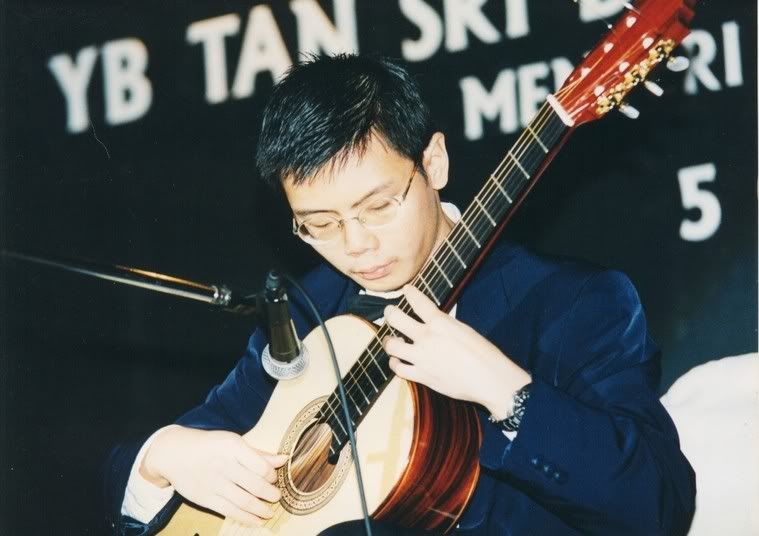
(Eek...my technique was SO bad back then...)
Up to now, I've had quite a few jobs up to now ('job' defined as something which has earned me money): musician, reporter, researcher, writer, and I think every single one of them was because of "Audaces fortuna juvat"
Tuesday, September 06, 2005
Still, I have less than 3 weeks left in Sydney, and I'm rushing to finish as much of my project (which, incidentally, I haven't gotten around to explaining yet) as possible before I have to go. Joss, my supervisor, is really friendly and cheerful at times, but through email his tone becomes rather brusque and harsh, which is somewhat confusing. He has also been putting subtle pressure on me by referring to my project as 'very important work', which thus far is a brilliant strategy because I'm so sensitive to criticism.
And my MSSL paper still hasn't been completed yet (I guess I should get round to explaining about it some day as well). It's like trying to kill a hydra...everytime I finish part of it, something else crops up that demands doing, or parts of it demands re-doing. I wrote the first draft in early June, and it has always looked like being a week from completion for the past couple of months. I hope dearly that I can finish it off by this weekend, but the jury is still out whether I will.
Am currently listening to Beethoven's 'Hammerklavier' Piano Sonata for about the 5th time today...music has been the thing that's been keeping me sane, but the pressure to prepare for my upcoming recital isn't too welcome.
But it'll be worthwhile in the end.
Sunday, September 04, 2005
To make sure that it's actually a blast and not a bomb (heh), I've been practising like crazy. It's not to reassuring that 9 weeks before the recital I still have about 3 pages of the Bach left to memorise, let along bring to performance level. My part of the programme is about 15 non-stop minutes of virtuoso music without any easy stuff in between for my fingers to rest, so I really have to make sure that everything is completely secure, as any insecurity will lead to tension, which in turn will tire me out really quickly.
As for work here, I can't believe that I only have 3 more weeks left in Sydney, but at least it looks like my project is making some progress, although whether I can manage to actually squeeze a publishable paper out of this remains to be seen.
Pablo has already left, and Sam is leaving this Thursday, so after that I'll be the only sucker here till I go. It's gonna be a bit lonely and depressing, but on the bright (kind of) side I can manage my time more effectively as I won't have anyone to hang out with.
Monday, August 29, 2005
Saturday, August 27, 2005
He seemed slightly discomfitted when he saw me. He said, "Uhh...I have slightly bad news...I just found out that the match today is an away game." Apparently, he had not picked up on the fact that the location of the match at Melbourne Cricket Ground probably meant it was not in Sydney.
We went into town anyway and spent the entire day walking a huge circle around the city centre, walking to Macquarie Point where we had spectacular views of the Harbour Bridge and Opera House, moving on to Hyde Park passing through the dodgy Kings Cross area (best shop sign ever: "THE LOVE MACHINE"), before walking back through Oxford St. before ending up at the Town Hall where we started. My legs were just worn out by the evening.
A couple of days ago, as I was wiping my spectacles in my morning, the damn thing broke off right at the bridge connecting the two lens, leaving me holding the one half on each hand. I did not bring any spare glasses nor contact lenses, so the prospect of spending a couple of days being effectively blind was not very palatable.
However, I fell on my figurative feet, as the AAO has an engineering department, so I brought my spectacles to them, and one particular technician, Stan, kindly spent an hour welding my specs together with a blowtorch(!). My glasses now look as if it's been through a flame thrower (which it effectively has), but at least it's essentially back in business.
While he was fixing my frame, he mentioned that he once worked as a jeweller (!!). His surname is Miziarski and he speaks with a strong East-European accent, implying he's very likely Jewish. It's such a stereotype, the Jewish jeweller...
Wednesday, August 24, 2005
He is a remarkably perceptive person (he has an unfinished PhD in educational psychology), and extremely blunt if he has something to say to me. On the coach journey to Coona, he suddenly commented, 'You seem as if you have something to prove most of the time...'.
Which is true.
I've spent most of the past few years being haunted by the spectre of failure, and pushing myself into an insane workrate. It's a complex motivation with many facets, driven in part by the memories of being a perennial underachiever in school, a thirst for glory and fame, and other psychological baggage. I've pushed myself this far, so it's just a means to a good end, isn't it? However...
'If you carry on like this for too long you'll get a nervous breakdown sooner or later', Kinwah said, 'and if you care so much about what people think about you, as you progress in your career you'll meet much smarter people...'. He says that if I put all my motivation into making people think I'm smart etc., I will crash the moment I meet true geniuses in my career.
The only way out is for me to put all my motivation into a love for science. So far, I've tried taking his advice, but it's not easy to make the transition. I'm the laziest git I know by far, and the laziness has been winning in the past few days. It's not that I don't love science, but sometimes when dealing with boring and tedious work, it difficult to call up the wonder and joy of discovery.
Thought of the day: I've been dealing a lot with the solar spectrum (more on that some other day), which involved working with some old data catalogues dating back to the 1940s and '50s. These are thick and heavy tomes encasing reams of arcane data, which are literally pages and pages of numbers. Back before the days before computers, it must have been an incredibly tedious and slow process to create the catalogues by hand. Yet there were people who devoted their entire careers to such unglamorous work.
What could have driven them?
Tuesday, August 23, 2005
Some of you also know I like to write science articles for the general public, and I hope to regularly post such pieces on the blog. Everytime I update that site, I will mention it in this blog, so regular readers have no need to bookmark both blogs.
Saturday, August 20, 2005
The AAO has 2 telescopes in Siding Spring out in the country, but as I'm doing a theoretical project, I wasn't really expecting to get to do any actual observations.
However, it turns out that my supervisor from UCL in London is coming down to Australia for an observing run on the Australian National University 2.3m telescope which is also based in Siding Spring, so I took off for 5 days from work to support this observation.
Siding Spring is right on the edge of the Warrumbungle National Park (I love Aussie names!) in NSW, and the nearest town is Coonabarabran, about 600km from Sydney. It was a 8 hour train/bus ride, first through the Blue Mountains, and then through cattle country. The only towns we passed by weren't so much sleepy as comatose.
Finally, we got to Coona:
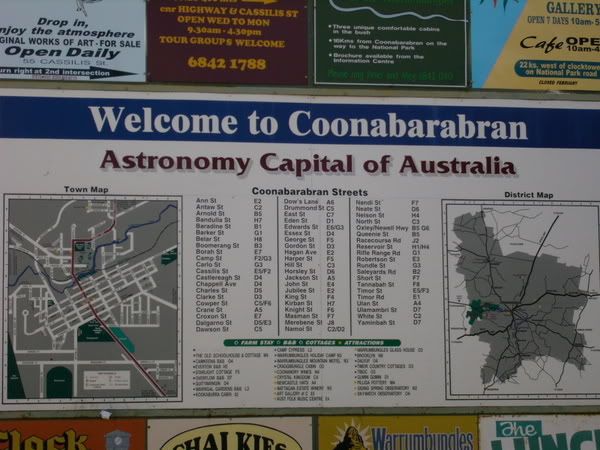
From Coona, we get a taxi up to Siding Spring, which is a mountain about 1000m high. We see a sign warning us not to disturb the local wildlife...
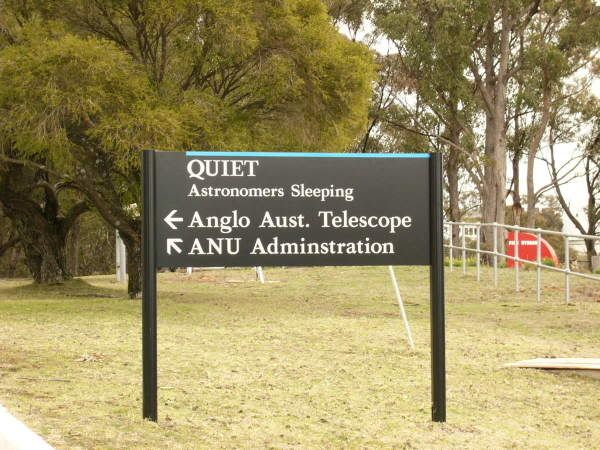
The first thing we see when we approach Siding Spring is the dome of the 3.9m diameter Anglo-Australian Telescope (AAT) looping over us...
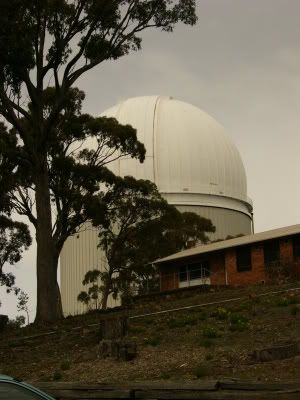
A closer view of the AAT dome...
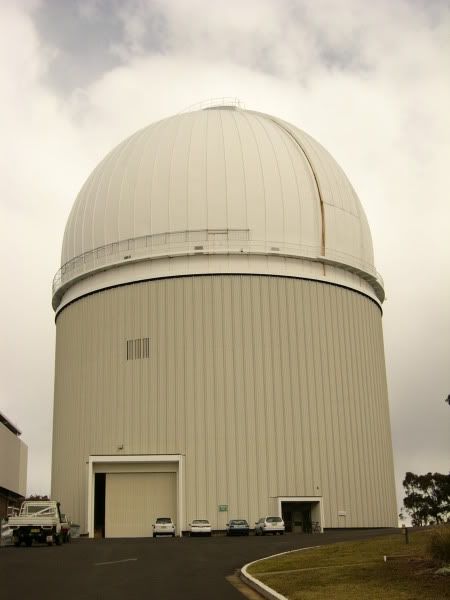
Close-by, a couple of scientifically-minded wallabies have also come on observing runs:
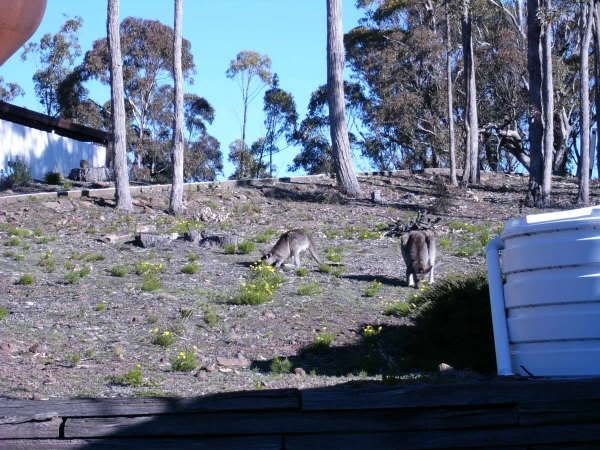
I'm officially an employee of the AAO, so I get a desk inside the dome. However, the actual telescope is off-limits to everyone apart from technical staff and observers, so I couldn't go close-up to the telescope. I got this shot from the tourist gallery. The telescope is on an equatorial mount, which means that the mounting is actually inclined at the same angle as the latitude of its position, which facilitates star-tracking, as you only need to track along one axis of the telescope:
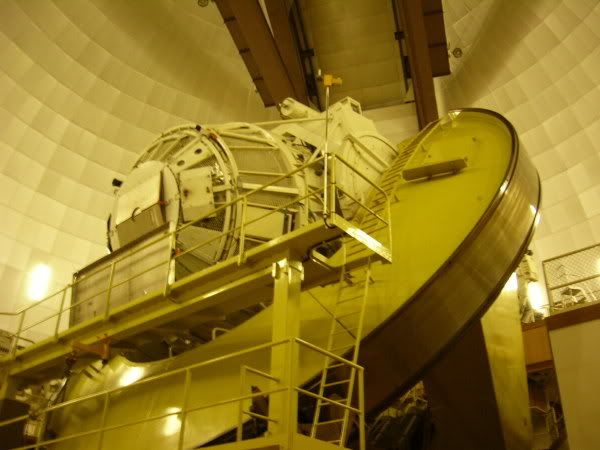
Just for reference, here is a picture of the AAT nicked off the net...

And a royal touch...
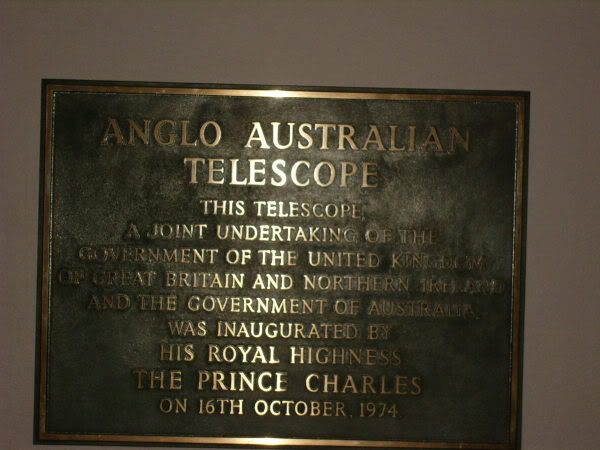
The telescope we'll be using is the ANU 2.3m reflector, which is in an 'alt-az' mounting, which is similar to a naval gun mounting. It's more difficult to track stars because u have to simultaneously adjust both axes at once. The entire building rotates with the telescope, and it's really cool as everything rattles and shakes as the telescope slews to acquire a new target...the big disadvantage is that they can't attack any plumbing to the dome, so the toilet is right at the base on the far side of this picture. The control room is about at the 2nd storey of the dome. To get from the control room to the main entrances means passing through the telescope...during observations, the light-spillage and thermal air drafts caused by this is unacceptable, so to take a piss, I have to walk out though the external door and walk down the metal stairs, all in pitch dark and freezing night wind...
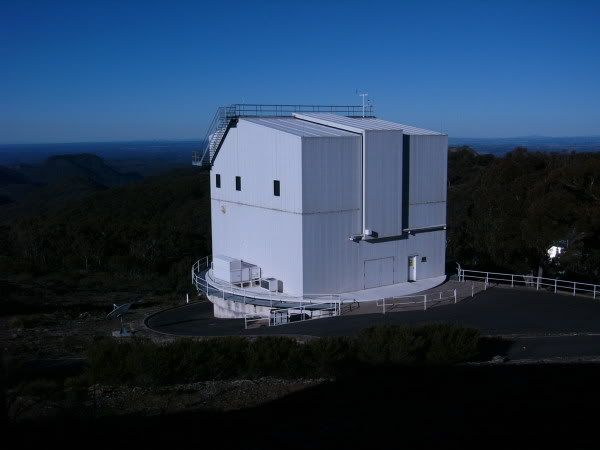
There are about 8 telescopes at Siding Spring...from L-R: ANU 15-inch, ANU 2.3m, ANU 40-inch, AAO 1.2 Schmidt, 2m Faulkes, and the 3.9m AAT. A couple of other smaller telescopes are not visible here.
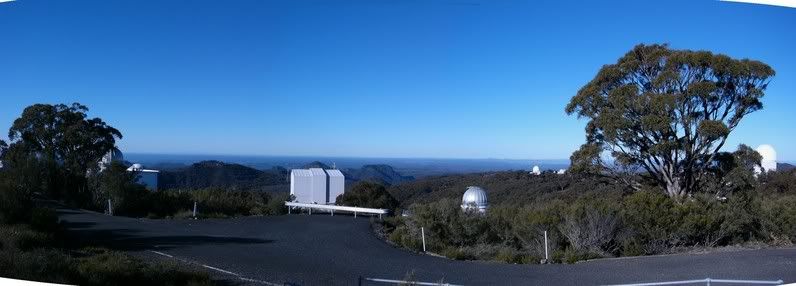
Siding Spring was chosen because there's hardly anyone within the horizon, and because it's high (by Aussie standards anyway). The mountains in the background of this view are about 100 miles away. At night, it's basically pitch-black all the way out to the horizon.
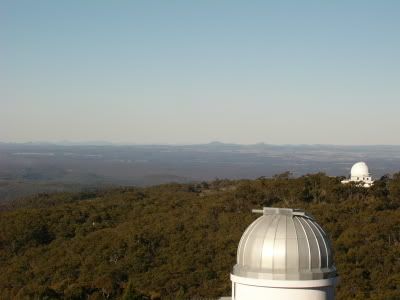
The surrounding areas are mostly national parks, and Siding Spring is the highest point nearby, so there were some spectacular views...
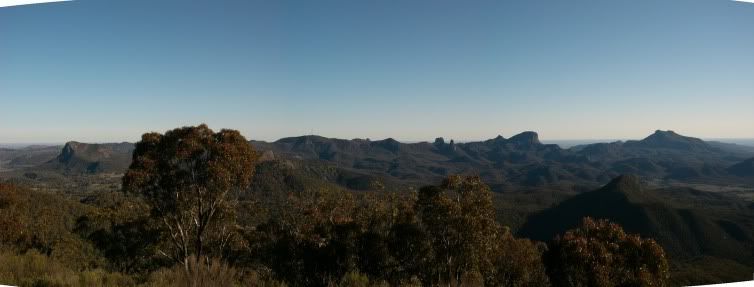
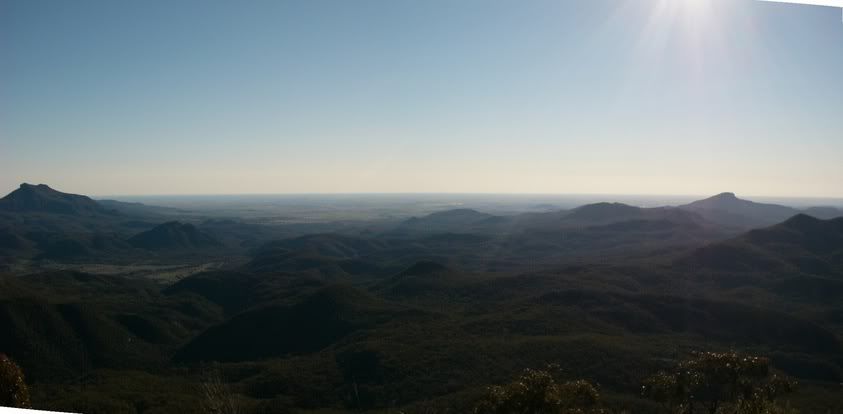
That's all for now...will be back on another day with more pics of the actual observations...
Wednesday, August 17, 2005
What? HERNIA? PERVS? One thing which I noticed about astronomers is this: they like to contrive really silly acronyms for things. I found this website called DOOFAS (Dumb Or Overly Forced Astronomical Acronyms).
Here are some of my favourites:
2D-FRUTTI: 2-D Photon Counting System (I swear, I didn't make this up)
ANIS: All Neutrino Interaction Simulation (LOL!)
BAD: Balmer-Absorption-Dominated (Nuclei)
BICEP: Background Imaging of Cosmic Extragalactic Polarization (feel the burn)
CANGAROO: Collaboration between Australian and Nippon for a Gamma Ray Observatory in the Outback (krazy!)
COLA: Compact Objects in Low power Agns
GOD: Gravity One Dimension (The paper was entitled `The likelihood of GODs' existence'...)
HIS/HERS: High Intensity Spectrograph / High Energy Range Spectrometer
HO-BAGS: Hubble Observatory BAckground Galaxy Survey
HOEs: Holographic Optical Elements
MACHO: MAssive Compact Halo Objects
MIRACLE: Mid-InfraRed Array Camera of Least Effort
OWL: Overwhelmingly Large Telescope (so big, it's ridiculous)
PIG: Partially Ionized Globule
PINOCCHIO: PINpointing Orbit-Crossing Collapsed HIerarchial Objects (Egad!)
POOPSY: Phase One Observing Proposal SYstem
SAURON: Spectroscopic Areal Unit for Research on Optical Nebulae (mmmm, nerdy)
SMIRFS: Sub Millimeter InfraRed Fiber-feed System (or something)
SPIFFI: SPectrometer for Infrared Faint Field Imaging
T-RECS: Thermal REgion Camera System
YORIC: Yet another Optimal Resolution Image Constructor (Alas...)
These are NOT made up....I recognise several acronyms I know of which are real. So, it would appear that astronomers have way too much time on their hands...must be while waiting for bad weather to clear during observations...
Friday, August 05, 2005
As a physicist, I regard the beginning of the nuclear age as a loss of innocence for physics... the entire Manhattan project which created the atom bomb involved countless physicists, many of them already well-established (like Fermi, Oppenheimer, Bethe etc) and others who would eventually go on to become Nobel-prize winners in their respective fields, like Feynmann and Segre. So in a sense, my intellectual predecessors were responsible for opening this Pandora's box, and I am personally fascinated by the history of this effort, which had its beginnings with the discovery of radioactivity in the late 19th century, at the end of the steam age.
It was also this moment when physicists went from being detached boffins to becoming a strategic resource...the nation with the most physicists would hold the key to power (this is of course not as simplistic, but certainly it must have seemed so in the immediate aftermath of Hiroshima and Nagasaki. Billions of dollars were poured into physics research, a lot of it directly into nuclear weapons development, but much of it had very tenuous links, like particle physics and space research. For scientists in the US and Soviet Union, making vague, indirect links to weapons programmes used to be a useful way to get research funding (a project with the word 'nuclear' or 'atomic' in it doesn't necessarily have much to do with nuclear weapons or energy at all).
I have been to Hiroshima some years back, and it was quite a harrowing experience; the Peace Park is such a serene and beautiful place, until you realise that before the bombing it was a densely populated slum. I dearly wish Nagasaki is the last time anyone ever uses the bomb, but... I think the decision to drop the bombs was the right thing to do.
Japan was being blockaded by mid-1945, most of its navy on the bottom and its army beaten back from across the Pacific, but there was still an absolute refusal to surrender unconditionally (the military elite were only hoping for a conditional 'surrender' which would mean, among other things, that no occupation troops were to touch mainland Japan and most of the existing power structures would remain intact).
It was intended that in the event of an Allied invasion of mainland Japan, every man, woman and child would fight to the death. This was no idle threat: in the battle of Iwo Jima, the Japanese residents (including elderly and children) there had flung themselves off a cliff rather than be captured by American troops. So if the invasion had occured, in addition to massive combat casualties on both the Allied and Japanese sides, huge numbers of Japanese civillians were likely to have perished as well. A million Japanese combat troops were still stationed in China/Manchuria, and they would have provided a huge fight for the Allies, as well as continuing the brutal oppression of the occupied Chinese.
So, I believe that in the cold arithmetic of war, the use of atomic weapons was a tragic, but necessary decision.
Wednesday, August 03, 2005
When I was a baby, my parents left me under the care of my father's eldest sister as my mother wanted to keep working; I only went back home with my parents in the weekends. Thus, I spent the first two years of my life in that house with my aunt's family, until my sister was born and my mother decided to quit work. There is hardly anything I remember from that period of infancy, but my parents tell me that my aunt's husband was very fond of me when I was staying in his house, and I used to cry whenever my parents came at the weekend to bring me home.
Years later, when I was about 4-6 years old, when my family went to visit this aunt, or when we were all at my grandmother's house, I would insist on staying overnight at my aunt's house... I still have memories from this part of my life, squeezing into bed with my cousins (they were 6-7 years older than me, and as I was my parents' eldest child, I regarded them as older brothers), and digging for toys in the musty dust-filled storeroom. I remember clambering up the shelves in the living room,looking for things I could play with.
After I was past 8 years old or so, my bond to my aunt's family waned... memories from my infancy and early childhood faded as I grew up, and I've hardly spoken to my cousins or their father since then. Still, I continued feeling a strong, unspoken, affinity to my aunt and her family. Whenever my family went to visit their house, I would somehow feel very much at home as every corner carried echoes of my early years. The cabinets which I had climbed up as a child now seemed so very small, yet so comfortingly familiar.
In the past decade, I must have not spoken directly to my aunt's husband except for greeting him (in part because I'm not very fluent in my supposedly native Hokkien language, and because the generation gap is so huge), yet went my mother told me he had passed away, I started crying (I have tears in my eyes as I write this). Maybe it's because he was present in some of the happiest memories of my life, and with his passing I seemed to have lost another link to my childhood.
I have not said anything about what sort of person he was, but on a level it doesn't matter. All my personal reminiscences of him have now regressed beneath the level of my conscious memory, and the emotion I felt at his passing is coming from a little boy who still lurks somewhere within my subconscious. Yet, I have one very vivid memory of him: I must have been 6 or 7, and my family was visiting his house. At that age, he seemed so towering, and he picked him up and swung me around as I squealed and laughed. In that brief moment, I was flying.
I have no other memories of anyone ever doing that to me.
Sunday, July 31, 2005
Joss is a very nice person, and in fact one of the most charismatic people I've met. He is effervescencely enthusiastic about the project we'll be doing (more on this later...). He might have noticed that I seemed rather glum most of the time.... but whenever I'm with someone who is very animated, I tend to be quite 'down', as if their friendliness is pushing me down. Or is it a natural suspicion towards people who are friendly towards me for no reason? He was also praising me a lot even on my first day at work, which made me feel a bit more unconfortable.... I tend to get uncomfortable when I get praised which I do not feel is warranted. I once had a friend who said that she liked praising people because it made her feel good...maybe he's like that as well. Personally, I feel that praise is devalued if it's given out too liberally.
Still, work is nice. The AAO shares is in the same compound as the Australian Telescope National Facility (which deals with radio telescopes...while the AAO operates optical/IR telescopes, and most of the buildings here actually belong to the ATNF. The ATNF also runs a lodge where visitors can stay, and this is where I'm staying. The other two summer students in this programme, Sam from Yorkshire and Pablo from Valencia (Spain), are also staying in my place. The rooms are en-suite, and the lodge is very well equipped, with a nice kitchen, free laundry facilities and TV lounge, and I'm basically paying hostel prices for this, so I have plenty of money to spend on other things.
I just went to downtown Sydney last weekend, and my pics of the harsh Sydney winter are here...
Monday, July 25, 2005
In any case, a quick update on what I've been up to... I was at MSSL for 5 weeks in most of June and early July, creating a new model describing relativistically shifted AGN reflection spectra. The model creation was reasonably straightforward, but the testing and verification has been an absolute bitch due to my inexperience in experimental x-ray astronomy, which wasn't helped by the fact that both my supervisors were away during my last week in MSSL.
Of course, on 7/7 the London bombings occured. I was at MSSL in Surrey (1 hour outside London) when it happened, so I wasn't directly affected by the chaos which ensued, but nevertheless it was emotionally catastrophic. It's not nice to have carnage happening in places which I'm familiar with (the Edgware Rd, Kings Cross and Tavistock Sq blasts were within walking distance of UCL, and I often take the No. 30 bus that got blown up with 13 fatalities). I'm familiar enough with the locations of the incidents to note the irony that the Tavistock Sq blast occured virtually in front of a statue of Mohandas Gandhi situated right in the middle of the square.
In the weekend after the attacks, I went to visit 'La Loco' Mel in Cambridge. The train to Camb from London departs from Kings Cross station (the National Rail trains were mostly unaffected, just the Tube), and there were missing-person notices plastering the walls in and around the station. A street corner outside the station was set aside for floral tributes from the public to the victims, with an army of journalists and TV camera crews nearby. I was standing outside watching the scene when I saw an old man giving his respects to the dead. It happened that the weekend was the commemoration day for the end of the Second World War, and this old gentleman had a chestful of medals, obviously a veteran of the carnage 60 years ago. It was deeply moving to see him quietly bowing his head to the victims, when he had already gone through the worst carnage in human history nearly an entire lifetime ago.
Anyway Cambridge was blast... Mel brought me for lunch at a tapas restaurant so she could laugh at my feeble attempts at speaking Espanol, we listened to a symphonic concert by the Camb Graduate Orchestra in the magnificent Trinity College Chapel, and took punt along the River Cam. Mel is doing her PhD in the Institute of Astronomy in Camb, so she brought me there to take a look... I was such a workaholic that I actually managed to get a fair amount of work done by remote connection to MSSL via one of the IoA workstations. It's a nice spacious place with plenty of large windows and greenery just outside. Mel also pointed me out to Andy Fabian a.k.a. King Carlos IV of Spain. Andy Fabian is famous because he's one of the most prolific authors in astronomy, and we nicknamed him King Carlos IV because he bears an uncanny resemblance to several portraits of the monarch we saw in the Museo del Prado in Madrid.
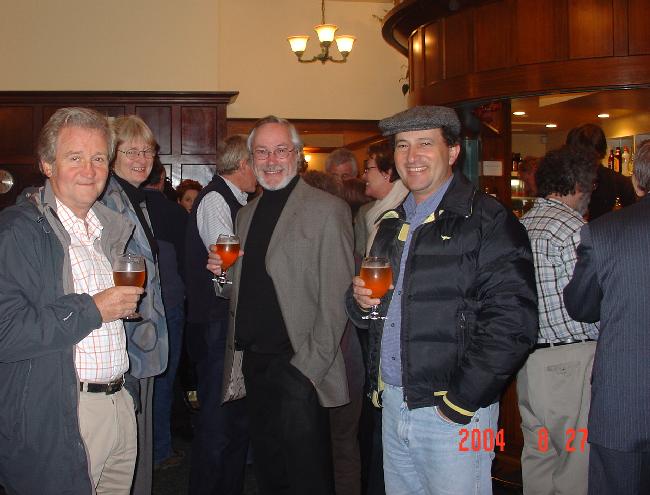

Separated at birth? King Carlos IV of Spain (left image, at left) and Andy Fabian (R)
A few days after returning from Cambridge I flew back to KL. I stayed in KL for only 4 days (although I managed to have a big argument with my parents within that time) before flying down to Melbourne in Oz, along with my sister. She's starting a degree in Creative Arts in the University of Melbourne, so as I was going down to Australia anyway, my parents decided to let me accompany her. Officially Melbourne was supposed to be a holiday for me, but I spent half the time helping my sister settle and sort out her things, while another part was spent trying to finish my MSSL project (unsuccessfully) via my hotel room's wireless connection. I didn't get to do much sight-seeing in Melbourne (my camera ran out of batteries, so no pics from Melbourne unfortunately), although I did manage to meet up with a couple of old friends (except *cough cough* Gin).
I flew over to Sydney last Sunday ... the Anglo-Australian Observatory (AAO) where I'm working is in Epping, a suburb about 30 mins train ride from downtown Sydney, and surprisingly I managed to get to AAO without any hassle. AAO is in the premises of the Australian National Telescope Facility (ATNF), and I'm staying in a lodge within the ANTF grounds just a few minutes walk from work. My supervisor, Joss Bland-Hawthorn, just flew back from overseas in the weekend, and he didn't come in yesterday (Monday), so I spent the day goofing around reading science magazines and trying to finish my MSSL project (again, didn't get very far). Joss has just come in today, but he's entertaining a guest so I'm still goofing off at the moment.
I'll write more about AAO and Sydney later, but for now I'd better wrap up this post.
Thursday, June 09, 2005
I'm staying with one of my supervisor's post-docs, Curtis. Before I came here, he warned that his flat is crammed with things his family sent him which he didn't need, and that he has the habit of working strange hours. When I first arrived at his flat, I saw that he wasn't exaggerating about his flat being cramped. Before saying anything else, I should mention that Curtis is the epitome of a Star Wars fan. I consider myself a fan, but I do not own 98% of all Star Wars publications nor a third of the toys (Curtis' own estimate). His storeroom, where I was to put up, was filled to the ceiling with boxes of Star Wars toys. We moved about half of the stuff to his living room, just enough for me to put my inflatable mattress. As a result, his living room, which already had stuff scattered all over the place is now packed to the brim with all manner of boxes and miscellaneous objects.
When I opened the window in my room (i.e. the storeroom) to ventilate it, he said, 'Oh good, that'll let in some insects for my carnivorous plants'. Cue awkward pause from me. He does in fact have carnivorous plants hanging near the windows around his flat, although they don't look as menacing as I'd imagine. He also has a couple of tropical plants in his bathroom, with several sun-lamps permanently shining on them. This has the unintended effect of turning his bathroom into a sauna.
He then mentioned to me, 'I hope you brought some plates of your own, because I have only one plate'. I did in fact bring along with me my tupperware and cutlery, but that was more with the intention of using it to cook instant noodles than for holding its own as my only utensils. He also didn't have any dish-washing liquid ('Ive never bothered, because I never entertain visitors'), so I had to buy some to clean up after I eat.
In spite of this situation, things are actually quite fine. Curtis is a bit eccentric to say the least, but he's pretty nice, and the fact that he seems to like working late means that we don't get into each others' way so much. His flat is a bit too cramped for my tastes, but there's an endless supply of Star Wars comics and books to keep me entertained, and my inflatable mattress is actually surprisingly comfortable.
The only slight quibble left is the fact that I have to walk about 40 minutes as part of my daily commute to work, This is a bit of a drag, but at least I get plenty of exercise.
Life is good here.
Thursday, May 12, 2005
Anyway, on Tuesday I went to a CD launch by my pianist friend Mei Yi, who is a fellow Malaysian. It was held at a piano centre in a posh part of London near Picadilly. I was supposed to meet Jane and Bobby there so that we can discuss our concert in November along with Mei Yi, but I was the first of us to arrive, apart from Mei Yi who was already there, but she was busy greeting people for a while before she withdrew to prepare for her recital. Thus, I spent quite a while milling about aimlessly amongst the literally chattering classes, partaking in the free beverages and Pringles on offer. As this was a private event, a lot of the people there were clearly Mei Yi's friends, and from their conversation they seemed to be mostly musicians as well. Apart from musicians themselves, most of the people there were rich old people who see themselve as patrons of the arts. The musician in me appreciates this, but then the socialist in me is shouting 'Bourgeouisie!'.
Mei Yi gave a short recital, followed with a lot of congratulations from the audience and a CD signing session afterwards. I won't say much more about the recital itself, except to say that she has a solo recital at Wigmore Hall next Thursday which I am looking forward to listening.
I was however impressed with the fierce adoration that Mei Yi has among her fans. I spoke to this lady who turns up to virtually every single one of her performances in London... she told me that at an earlier concert in Wigmore Hall, Mei Yi played before two other musicians. After Mei Yi finished, the lady just left the hall because she went just to watch Mei Yi. One of the people who spoke after the short recital concluded with, '...and we look forward to seeing Mei Yi becoming one of the premier concert pianists!'.
I would be a bit more cynical than that... she's a fine pianist, but she's already 25 and there are so many other pianists out there that the competition is insanely ferocious. In the naivette of my youth, I had wanted to be a musician. My parents had given a firm 'no' to that, and I was extremely angry at the time, but now I know actual professional musicians and how they have to struggle, I have to admit that I see their wisdom.
As for Mei Yi, even if she doesn't hit the absolute prime-time, I think she has already secured for herself a great career as a concert pianist.
Saturday, May 07, 2005
Immediately after the cosmology exam, as I was packing up my stuff, a guy from my class whom I didn't really know came up to me and said, 'Khee Gan, could I ask you something?'. I'm used to people coming up to me asking me questions about the courses, occasionally even from people I do not know, so I just said yes. 'Is it true that you left early in quantum yesterday?'. Usually, people leave early in exams if a)They can't do any of the questions and can't be bothered to sit there in boredom, or b) They are so good at the paper that they've finished everything well before the allocated time.
Now, I'm fairly well known in class as the guy who always asks questions in class, and my reputation for being the top student in class is quite widespread (even though technically I'm not the top student...my average lagged Xinhui's by < 1% last year). So he must have been implying that I was so smart that I can walk out of the toughest paper before time. I gave him a puzzled look and said no. He turned to his friends and said, 'See...he didn't leave early!'.
I've had earlier indications about crazy rumours circulating about my prowess. Last term, Courtney in my space systems tech class leaned over to me and asked, 'Khee Gan, out of sheer curiosity, is it true that you got an average of 97% last year?'. Now, I was pretty pleased about my 91%, but I personally think that 97% is just plain insane and out of reach. I never boast as I feel that arrogant people are just asking to be put down, but apparently in this case the fact that I don't talk about my results has just let all sorts of rumours about me spring up. Maybe there are rumours that I'm being nominated for the Nobel prize floating around as well.
Most people get gossip about relationships and stuff. I get gossip about my imaginary intellectual prowess.
Tuesday, April 26, 2005
Monday, April 18, 2005
There was certainly an element of luck involved, because it's much easier to show of one's musicality playing Beethoven, than with Liszt. Incidentally, Herbert Schuch was the German I watched at the beginning rounds with the love affair with his sustain pedal, as I mentioned a couple of posts ago, so I guess his combination of exquisite tone and lavish romanticism has more than overcome any stylistic doubts (I still think his Bach was totally wrong!).
Of the two Liszt concertos, I personally prefered the 1st over the 2nd, which probably coloured my perceptions regarding the French pianist (who played the latter), because he received a very enthusiastic response from the audience, while I didn't find myself as touched by it. The Beethoven by Schuch was very well played, but again I personally felt his approach was a bit archaic in this time and day, and would be less out of place 50 years ago. Don't get me wrong, I love a lyrical and romantic approach towards interpretation, but from an objective point of view (i.e. that of the typical music critic) I wouldn't have thought he could progress through the first rounds.
In the event, Schuch in fact did win the first prize, with Neuburger getting the 2nd prize and the Gilham, the Aussie, getting the 3rd prize (I should also point out that both Neuburger and Gilham are only 18 years old, while Shuch is a comparatively more mature 26). However, I thought all three pianists were absolutely incredible, and I would have paid money to watch any one of them alone. Somehow, having to seat there and figure out who was better detracted from the enjoyment from just listening to the music.
More random stuff about the competition... after the competition, I was present at the reception. A random old chap mistook me for one of the semi-finalists who was a Chinese, despite the fact that the pianist was about 6 inches taller and didn't wear specs. I also got to speak briefly with the conductor who led the London Phil, a nice lady called Sian Edwards. When I mentioned that I was doing physics in UCL, she asked me if I knew Marshall Stoneham, one of the professors there (yes, I did know him). Apparently, Prof. Stoneham is an amateur horn player, and when Sian Edwards was a young girl, she used to go to his house to play in a string quartet... talk about a small world.
The Earl of Wessex (Prince Edward, brother of Charles) was present as the VIP, and he is WAY better looking than the Prince of Wales. While he was on stage to give out the prizes, I was horrified to see that he was sitting on a humble straight-backed chair. In Malaysia, the organisers would have been shot, hung, and then quartered if even the most minor royalty had to sit on anything less than a full-blown leather sofa armchair with a long yellow carpet leading all the way up to it.
A picture of the finalists awaiting the moment of truth: (L-R) Neuburger, Shuch and Gilham. The Chinese guy in the back is my alleged spitting image according to some 80-year old eyes.

Sunday, April 10, 2005
This is true to a certain extent... I have been practising my guitar and exercising a lot more than I did in the same period last year. I think the problem is that I treat these as part of my schedule, rather than as something extra. My parents probably wouldn't think of me as being too organised from having me lazing around the house for 19 years, but truth is that when I have a large period of time free in front of me, I mentally plan things even when it is probably unnecesary. For example, I already have my exercise schedule planned out for the next week....gym Tuesday, short run Thursday, long run Friday, gym Sunday. Or at least, that's how I plan it... I'll probably not follow it to the letter, but it's the thought that counts (i.e. I'm stressing myself over it).
The part of my revision that is the most time-consuming is the process of understanding the material. One of my courses is solid state physics (affectionately nicknamed solid-s*** physics) is taught by a lecturer whom we have (equally affectionately) nicknamed 'Horseface'. As I have mentioned before, Horseface is a lecturer only in name, and his 'teaching' involves some rambling in class and scribbling random undecipherable things on the board. Thus, literally all the material in solid-s*** is totally new to me, and I have learn it from scratch. The course isn't trivial either, as the material is conceptually new.
One thing I've realised from my revision is the process of intuition that goes with being a physicist. When going through the notes, there is always the temptation to think that just because I can follow the mathematical steps in the derivations, I 'know' the material. But just following derivations in a linear way isn't assimilating it... doing physics requires one to 'feel' the subject matter. It's hard to describe, but 'feel' is the only word I can think of. I refuse to move on from a section until I can feel it intuitively, and understand what it means physically and how it relates to other things. The intuition is one of my main strengths, and if I don't make sure I intuitively understand the material, there isn't much to differentiate me from Mr. "I-Hate-Physics-But-I'm-Doing-This-Course-Because-Investment-Banks-Like-Physicists".
It's back to the grind tomorrow morning....
Sunday, April 03, 2005
Ivor is 71, although he looks in his 50's. After a light lunch with his wife, we got down to the business of checking out his guitars and playing for each other. The thing we have in common is that we both take lessons with Carlos, although apparently he has been playing for almost 50 years, before taking up classical guitar seriously in the past year or so. He has at least 3 concert guitars (at least, he showed me 3 of them), and it was interesting to try them, as I have essentially not touched any other guitar apart from my own in the past couple of years. Still, it must be said that I still prefered my own guitar, which I guess is probably because I have been accustomed to it for so many years.
Ivor is very well-travelled, and he has been to the Far East many times, and this is reflected in the furnishing of his house, which isn't large, but very nice. We swapped stories with each other, and I was there for a few hours, just playing for each other and talking about music.
In the evening, I met up with Jane outside the Royal Academy of Music. She had managed to get a couple of tickets to the first round of the London International Piano Competition, which was being held in the Duke's Hall in RAM. It's been some time since I went out for a concert or recital, and here was the prospect of listening to a half-dozen of the most promising pianists from all over the world. The Duke's Hall isn't a very large hall, but it certainly has an atmosphere, with paintings of musicians lining the wall, large chandeliers overhead and a full-scale pipe organ just hidden away behind some partitions. A Steinway concert grand piano was the solitary object on the stage, and we took front-row seats just to the left of the piano, which allows a good view of the pianists' fingers.
There were 5 pianists in the session we went to; the first was Lithuanian girl, and there was a German guy, two Russian pianists (one guy and one girl), and one girl with her nationality listed as Israeli but with a Russian name. Each pianist has about 30 minutes of music to present, selected from a given list, although there were no repetitions of repertoire among the competitors of the present session.
It's extremely interesting to be able to listen to several different pianists one after another... in normal concerts, the listener has to contrast the musician with others from memory. Overall, all the competitors were superb pianists... but the difference in their styles were definitely there. The Lithuanian girl and Russian girl were in my opinion the best of the evening... both were technically superb, yet played with feeling and panache. The Russian guy was a bit of a robot unfortunately... he was clearly nervous, and the nervous energy transfered well into Lizst and Bach, but when he play a Schubert sonata, it was totally obvious that he didn't have the delicacy and lightness of touch to play it properly. The German was not bad, and I enjoyed his Romantic approach, but he seemed to be in love with his sustain pedal, which totally ruined his Bach.
Overall, it was an enjoyable evening, and I will probably be going to the grand finals in about 10 days....
Sunday, March 27, 2005
Easter break has started, spring has arrived early this year, although I'm not too thrilled at the prospect of staying over during summer in a country where air-conditioning and fans are a bit of a rarity. In the meantime, I'll be studying for most of Easter, although fortunately for me I'm only doing 5 papers in my finals this year (as opposed to 7 last year), so this Easter break should be a bit more relaxed than last year's.
I don't think I have mentioned my plan for the coming summer... immediately after my finals, I'll be going over to MSSL in Surrey to do work for my supervisor, mostly involving writing a paper based on work done in just-completed research project. In mid-July, probably, I'll flying down to Australia, as I have been accepted to an internship in the Anglo-Australian Observatory near Sydney. It should be fun, and I can't wait to visit all my friends in Melbourne and Brisbane (can't think of any friends who are in Sydney, though...). My sister is going to start her degree in Melbourne in July as well, so I might go there first to help her settle.
Anyway Happy Easter to all...I'm going to take a nap now....
Saturday, March 19, 2005
Dear Kwang Yang,
I have corresponded with you not too long ago regarding philosophy teaching in Malaysia, and your excellent article on life-long learning has made me want to share my experiences with you.
When I was still in early primary school (I think in Standard 1 or 2), my parents bought me a set of childrens' encyclopedia. Now, I'm sure a lot of Malaysian parents buy their children encyclopedia sets, but I actually set about the task about actually reading them. To this date I'm still unsure as to why I did this, but nevertheless I did. This was clearly before the full weight of the exam paradigm hit me (there isn't that much to study in Primary 1 and 2, after all...), and just before the full weight of the information age hit with 24-hour cartoons on satellite TV and video games (this latter was due at least thanks to my parents, who have never succumbed to years of my petitioning to buy a Sega Megadrive). I soon graduated to raiding my parents' collections of 10 year old back-issues in Reader's Digest and Far East Economic Review (!).
For better or worse, I have never stopped being addicted to books, and throughout my primary and secondary education I would rather curl up in my bed with a good book than do my homework. In this respect, I was somewhat fortunate that my parents were too busy to supervise me too closely, and I managed to go through 11 years of state-education without doing much homework at all (my primary education was in a Chinese-medium school, and I consistently got into trouble because of this... secondary school was a government school, which meant very few teachers ever cared...).
I managed to scrape through that 11 years with reasonably good, if not exceptional results... I was intelligent enough to do well in primary education without studying much, and in secondary school I became an expert in last-minute cramming despite my aversion to regular work.
I am now studying in London, doing physics, a subject which I was always fascinated with, and which my parents to their credit allowed me to do, despite its dubious utility (to Malaysian eyes, that is). At the risk of seeming immodest, I have blossomed in university, and I am the top student in my year (there is a Singaporean Education Ministry scholar here who barely edges me in exam performance, but more of my lecturers would agree that I am the better student overall). One of my research supervisors, who has worked with the top physicists in the world, believes that I am one of the top few brains to come from Malaysia, although you would certainly not see that from my SPM or PMR results.
There are almost certainly a lot more intelligent Malaysians out there... my IQ isn't exceptionally high (only about 120-130, and I know friends who are 180). But it is not intelligence which makes me a good physicist, but a critical and questioning mind as well as an ability to think creatively (qualities which, alas, I rarely see in Malaysians).
Clearly, I did not learn these qualities from the Malaysian educational system; indeed, they are IN SPITE of my schooling. You might be surprised that I was totally uninspired by physics in secondary school.... I spent most of my time either asleep or ignoring the teacher during the physics classes. My inspiration to do physics was from reading books outside my curriculum (often at the expense of my schoolwork), and from an inspirational teacher I had in A-levels.
While I do not deny the fact that I had learnt a lot of things from my formal schooling (in particular, I was fortunate that most of my mathematics teachers were good), nevertheless if I not for my intellectual rebellion against the educational system, I would not be where I am today.
I think it's sad that my desire to learn had to be sustained AGAINST the educational system, instead of being fed by it. Perhaps not everyone can be as passionate about a single subject like me, but I have many other interests in history, literature and philosophy in addition to science, so I'm far from a single-minded nerd.
In UK, students who decide to study subjects like history, literature or art do so because they are passionate and interested in it; in Malaysia, they do so because they cannot be accepted into university to do 'proper' subjects. I think this is a sad symptom for the overall condition of a country which aspires to be developed.
Regards,
Khee Gan
Friday, March 11, 2005
The crux of the matter was that I had to take full responsibility to my work, as it would eventually (hopefully) make its way into the body of scientific knowledge. Last summer, I was carrying out science as well, but there was a lot more hand-holding in the sense that I already had the program sitting there waiting for me, and I just had to feed it numbers and hope that the outputs matched the observed results. Even when I had to help Yong Chen make modifications to the code (adding in the flared disk geometry), there wasn't such a sense of responsibility as it didn't seem as if the work was going be published.
However, it has been made clear to me that if things work out well, I will be carrying forward with my work over summer, and possibly be the principal author for a paper on the work. Also, the fact that I wrote the program myself means that I'm personally responsible for any cock-ups in it. At every step of the way, I had to double- and triple- check everything to make sure that there are no mistakes, and that everything can be explained in a convincing manner.
In that sense, it's an honour that my supervisors have entrusted me with this project, as third year students are normally thrown some problem that has already been solved, instead of giving original work. But there IS a completely different attitude, may I say a scientific attitude that I have to adopt....
Actually, one of the main reasons I've been so busy is because I have been working on my final project report....which is FIFTY bloody pages long. And the worst thing is that I have the entire thing sitting in my head, but whenever I sit down to put it down into the report it doesn't seem to work immediately, and I have to spend ages modifying and perfecting every single bit before I can let it go. Repeat ad infinitum for 50 pages....
Saturday, February 19, 2005
When I mentioned this to Kinwah, he seemed to be rather annoyed. He told me that what I was doing was part of front-line-research, even though my role in it was a minor one, so I should be happy with it as most other students get projects which are 'recycled' stuff which the supervisor has already done before. In fairness, even though the bulk of my work was something any competent programmer could do, the background preparation required me to know the problem in its scientific context.
Having said that, creating a program to model the spectrum from supermassive-black holes in galaxies at the edge of the universe is really cool when I'm not sitting in front of my computer swearing at a bug that I can't find. In any case, I have a month left to prepare my presentation and report, which is plenty of time, apparently.
In any case, this does mean that I'll have more free time on my hands, and I can now renew my acquaintance with my guitar. I've been suddenly hit by the performing bug, and if anyone knows anywhere that I could have a recital near London, let me know.
Saturday, February 12, 2005
As a slight aside, if all goes well, I'll be insanely busy this coming summer. I'm applying for a bursary to do research with my supervisors in MSSL in Surrey (about 40 minutes outside London), officially for 8 weeks. In addition to that, I'm applying to do an internship in the Anglo-Australian Observatory outside Sydney, and if I get that I'll probably be spending nights playing with big big BIG telescopes. If I get offers for both, I'll take both on. This lasts 10 weeks. 10 + 8 = 18..... I have maybe 3 1/2 months of summer vacation at most, so how would I make it work. Fortunately, the bursary for the research at MSSL is provided for by a organisation called Nuffield Foundation, but my supervisors will (obviously) be supervising me for the research, and they'll be pretty flexible about timing so long as I get things done.
Anyway back to Kinwah's latest comments/advice to me. His current PhD student, Steven, has gotten himself a post-doc position in Stanford U., and so he told me that Steven could probably help put in a good word for me if I wanted to apply to Stanford for a PhD. Steven is going to be continuing as an X-ray astronomer, so if he's going to be any help to get me into Stanford, I would obviously have to go into X-ray astronomy as well. I do get the vague feeling that Kinwah is trying to push me into his field....
He also said that I remind him of Roberto, his second PhD student who is now on a fellowship at Harvard, in that I am more of an intuitive physicist rather than a purely theoretical type. However, if I were to get a strong theoretical grounding and work mainly as a phenomenologist or experimentalist (e.g. like Enrico Fermi), then he thinks I will be very good at that.
I've always regarded experimentalists as playing second fiddle to theorists, possibly because most of the famous physicists that laypeople hear of are theorists (Einstein, Bohr, Hawking). Also, experimentalists tend not to be able to have so much intellectual ownership of their work, as they tend to work in large groups, compared with theorists. Nevertheless, it's impossible to overestimate the importance of experimentalists....modern science is profoundly based on the experimental method, after all....
My youthful dreams of making an impact on the world a la Einstein and Feynmann, however, have been dispelled by reality. 99.999% of physicists make contributions which the layperson would have heard of, even if they win a Nobel prize (how many Nobel Physics laureates can the average person name off the top of their head?). Science is first and foremost about learning about nature, and the act of doing science should be the greatest reward any scientist can have. Anyone who expects greater rewards from science should look for another career.
Saturday, February 05, 2005
I haven't had much programming experience, apart from an abortive attempt to learn VisualBasic before university. I must say it can be a frustrating but absorbing activity. There's nothing like sitting in front of the computer, cursing and swearing while trying to identify the one flaw in the code that's keeping the program from running properly. I literally refused to leave my computer until I hunted down my adversary like a hunter tracking an insidious but elusive prey. Now I understand why 'techie' people often end up neglecting personal hygiene, sunlight and social contact.
Another thing about the past week or so was that I've put aside some time to practise my guitar and listen to music. It's the opposite of drugs I think....when I don't have music, I might not really notice it, but when I get back into it, I can't imagine not having it in my life.
Last Tuesday, I went to a chamber music recital in my uni, and Prof. Miller from my department was one of those performing. I first met Prof. Miller not when I took his Electromagnetic Theory course last year, but before that when he was organising a recital where I played in. Even though he is already in his 60s, he still has a deep baritone voice, which he puts to good use yelling at the students chatting away in the back of the lecture theatre. In fact, he once told me that when he was young, he had toyed with the idea of going professional... he felt that he was "better than the worst" of the opera singers he had worked with.
He was singing a few Schubert lieder ('songs' in German, which have evolved into a genre of their own) called Winterreisse. The lyrics are based on poetry by Wilhelm Muller...here's a typical one:
9. Irrlicht (Will o’ the Wisp)
In die tiefsten Felsengründe
Lockte mich ein Irrlicht hin;
Wie ich einen Ausgang finde,
Liegt nicht schwer mir in dem Sinn.
Into the deepest mountain chasms
A will o’ the wisp lured me;
How to find a way out
Doesn’t worry me much.
Bin gewohnt das Irregehen,
s führt ja jeder Weg zum Ziel;
Uns’re Freuden, uns’re Wehen,
Alles eines Irrlichts Spiel!
I’m used to going astray,
And every way leads to the goal.
Our joys, our sorrows,
Are all a will o’ the wisp’s game!
Durch des Bergstroms trockne Rinnen
Wind’ich ruhig mich hinab,
Jeder Strom wird’s Meer gewinnen,
Jedes Leiden auch sein Grab.
Through the mountain stream’s dry channel
I wend my way calmly downward.
Every river finds its way to the ocean,
And every sorrow to its grave.
...and that's one of the more cheerful ones!
